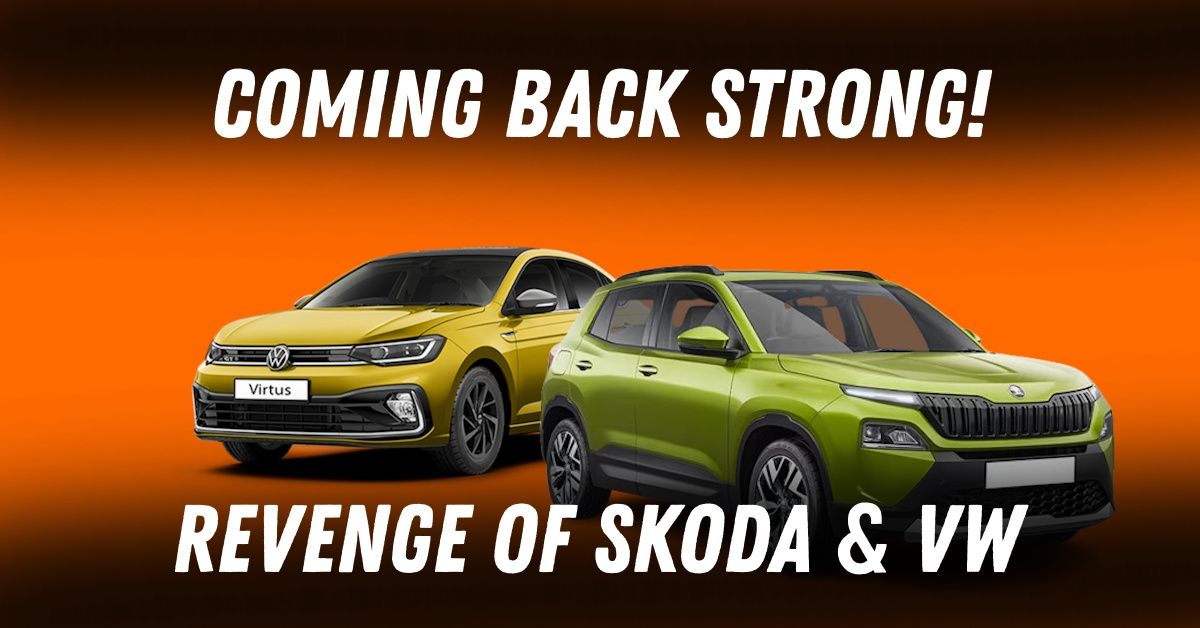Skoda, Volkswagen's Strong And Steady Comeback In India: Kylaq & Virtus Lead The Charge


Skoda-Volkswagen’s combined sales of 10,153 units in April 2025 underscore its resilience in India’s passenger vehicle market, which saw mixed fortunes for most brands. The group’s performance was anchored by strong demand for the Skoda Kylaq compact SUV and Volkswagen Virtus sedan, both of which defied broader segment trends.
Skoda contributed 7,302 units, while Volkswagen added 2,851, reflecting steady consumer interest in their European engineering and safety-focused offerings. The group’s year-on-year growth trajectory remains robust, particularly against rivals grappling with steeper sales drops.
The Skoda Kylaq emerged as the group’s star performer, accounting for 5,364 units in April. Launched earlier in 2025, this sub-4-metre SUV has quickly carved a niche in a segment crowded with established players like the Tata Nexon and Hyundai Venue.
Its appeal lies in a blend of premium design cues borrowed from larger Skoda models, a cabin prioritising durability over flair, and a 1.0-litre turbo-petrol engine tuned for urban agility. The Kylaq’s 5-star BNCAP safety rating and competitive entry price have resonated with safety-conscious buyers, though its stiffer suspension setup polarises opinions on ride comfort.
While the Kylaq’s rear seat space is adequate rather than generous, its 360-litre boot capacity under the parcel shelf addresses practical needs. The top-spec Prestige variant’s sunroof and ventilated front seats add a touch of luxury uncommon in its price bracket. However, the SUV’s cabin materials, though robust, mirror the hard plastics seen in the Kushaq, raising questions about long-term refinement.
Volkswagen’s Virtus sedan defied the industry’s SUV-centric shift with 1,605 units sold, representing over half the brand’s April volumes. Its success hinges on a compelling combination of highway stability, responsive steering, and a 1.5-litre TSI engine option that appeals to driving enthusiasts. The Virtus’s understated design and spacious cabin have helped it inherit the legacy of the popular Vento, proving that well-executed sedans still hold relevance.
The sedan’s performance credentials are particularly notable, with the 1.5 TSI variant offering a blend of efficiency and power that few rivals can match. While the segment continues to contract, the Virtus has cultivated a loyal following among buyers prioritising driving dynamics over elevated seating positions.
Beyond the headline performers, the group’s broader lineup faced headwinds. The Skoda Kushaq midsize SUV managed 783 units, a 12.7% drop from March, while the Slavia sedan recorded 1,048 units, down 11.5%.
Volkswagen’s Taigun SUV mirrored this trend with 1,155 units, reflecting a 27% monthly decline. These figures suggest intensified competition in the midsize SUV space, where rivals like the Hyundai Creta and Kia Seltos continue to dominate.
The premium Tiguan, with 91 units, remains a niche offering, underscoring the challenges of positioning high-end models in a price-sensitive market.
Skoda-Volkswagen’s roadmap includes bolstering its SUV lineup with upcoming launches like the next-generation Kodiaq, while recent additions like the Tiguan R-Line aim to refresh the premium end.
The Kylaq’s early success demonstrates the potential of India-specific products tailored to local pricing expectations and feature demands. However, sustaining momentum will require addressing refinement concerns in entry-level models and enhancing after-sales service perceptions.
The group’s emphasis on safety and driving engagement continues to differentiate it in a market increasingly dominated by value-focused offerings. As emission norms tighten and consumer preferences evolve, Skoda-Volkswagen’s balanced portfolio of sedans and SUVs positions it to capitalise on both traditional and emerging buyer segments.
With the Kylaq establishing itself as a volume driver and the Virtus maintaining sedan relevance, Skoda-Volkswagen appears well-placed to weather market fluctuations. The coming months will test its ability to translate engineering strengths into consistent sales growth, particularly as rivals ramp up ADAS and electrification efforts. For now, the group’s focus on core competencies-build quality, safety, and driving dynamics-offers a compelling proposition in India’s complex automotive landscape.